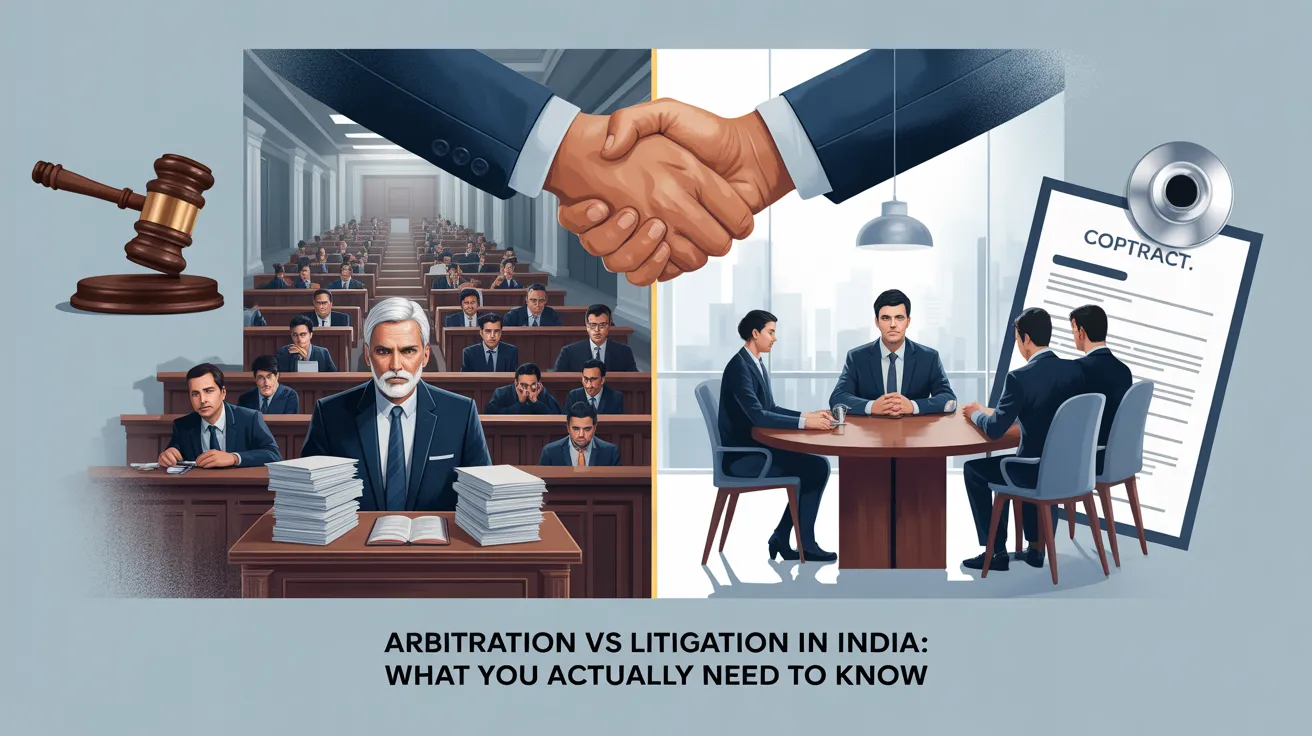If you run a business in India small, big, or in-between you will, sooner or later, run into someone who doesn’t pay, doesn’t deliver, or just won’t cooperate after taking your money. When that day comes, you’ve got two real choices: take them to court or take them to arbitration. But most people have no clue what either actually means until they’re knee-deep in a mess.
Here’s what you really need to know. No sugar-coating. No legal jargon overdose. Just straight talk.
FIRST WHAT IS LITIGATION?
Litigation is the official courtroom route. You hire a lawyer, file a case in court (civil or commercial), and the judge decides who’s right. Sounds simple. It’s not.
∙It's slow.
∙It’s messy.
∙It’s very public.
∙And it can take years.
If your matter involves property, money, a broken contract, or unpaid dues you can go to court under civil law or commercial law. But if you’re thinking it’ll be over in 6 months, you're dreaming. Courts in India are packed. Even serious, urgent matters can take 3–5 years, and that’s if you’re lucky.
Still, some cases need court. We’ll get to that.
WHAT’S ARBITRATION?
Arbitration is the private way of fighting. It’s outside court. You and the other side agree to have someone a neutral, usually a lawyer or retired judge settle your dispute. This only works if both sides have agreed to it usually through a contract clause.
In arbitration:
∙You avoid crowded courts.
∙You choose the arbitrator.
∙You decide the rules and schedule.
∙It stays private no court records, no public judgments.
Sounds better? Sometimes it is. But it’s not magic either. It can also become a long, painful process if not done properly.
REAL TALK: HOW DO THEY ACTUALLY COMPARE?
PROS AND CONS (THE ONES LAWYERS DON’T ALWAYS TELL YOU)
Litigation Good when:
∙You want the matter on public record (to show the world you're serious).
∙You need urgent orders like freezing bank accounts or stopping someone from selling assets.
∙It’s a complex mess with multiple parties and layers.
Problems:
∙Court calendars are jammed.
∙Adjournments kill momentum.
∙Opponent can drag it for years.
∙Even after winning, enforcing it can be another battle.
Arbitration Good when:
∙You want it quiet no press, no gossip, no public filing.
∙Both parties are professional and will follow the process.
∙The contract already has a solid arbitration clause.
∙You want some control over how things go.
Problems:
∙Arbitrators cost serious money and the fancier the arbitrator, the more you pay.
∙If the arbitration clause is vague or half-baked, it creates more confusion than solution.
∙If the other side drags their feet or doesn't cooperate, you'll need to go to court anyway (ironically).
SO, WHEN SHOULD YOU CHOOSE WHAT?
Go to Arbitration IF:
∙You have a well-drafted contract with a clear arbitration clause.
∙You’re dealing with a one-on-one commercial dispute.
∙Both parties are on relatively equal legal footing.
∙You want privacy and quicker closure.
Go to Court IF:
∙There's no arbitration clause in the contract.
∙You need immediate interim relief (injunctions, asset freeze, etc.).
∙There are third parties involved, or the dispute is multi-dimensional.
∙The other party is totally non-cooperative or missing.
THE BIG QUESTION: HOW MUCH TIME AND MONEY?
Litigation in India
∙Time: Minimum 3 years. Realistically 5–10 if it gets appealed.
∙Cost: Depends on your lawyer. But if you count time, staff cost, follow-up it adds up fast.
Arbitration in India
∙Time: Ideally 12–18 months. Can go longer if not managed well.
∙Cost: Arbitrator fees, venue, legal fees. ₹2–5 lakh is normal for medium-value disputes.
For high-value ones? Sky's the limit. People think arbitration is cheaper. That’s false. It’s faster, not cheaper unless you value time, which most serious businesses do.
IS THE FINAL DECISION BINDING?
Yes. Whether it's a court judgment or an arbitration award, both are enforceable.
∙Arbitration awards are enforced like court decrees (after some paperwork).
∙But the other side can try to block it by challenging it under Section 34 of the Arbitration Act. Courts have gotten stricter they won’t let parties challenge awards just to waste time.
But yes, it can delay things.
If your arbitration is international (one party outside India), then the New York Convention kicks in and awards passed abroad can also be enforced in India, if conditions are met.
WHAT IF THE ARBITRATION CLAUSE IS MISSING?
Then forget arbitration. You’re stuck with litigation unless both parties agree later (which rarely happens once a fight starts).
And no just mentioning the word "arbitration" isn’t enough. Your clause must clearly say:
∙That disputes will be settled by arbitration.
∙How the arbitrator will be appointed.
∙Where it will happen (the seat).
∙What law will apply.
A vague clause can be worse than no clause. You’ll end up fighting just to figure out how to fight.
FINAL WORD: WHICH ONE SHOULD YOUR BUSINESS USE?
Don’t make a habit of blindly copying dispute clauses from other people’s contracts. Most of them are trash.
Decide what works for your business. Here's the raw filter:
∙Want control, speed, privacy? Arbitration.
∙Need legal pressure, urgent court orders, public accountability? Litigation.
Also, talk to your lawyer before finalizing your agreement. A solid dispute clause can save you from a 3-year headache.
